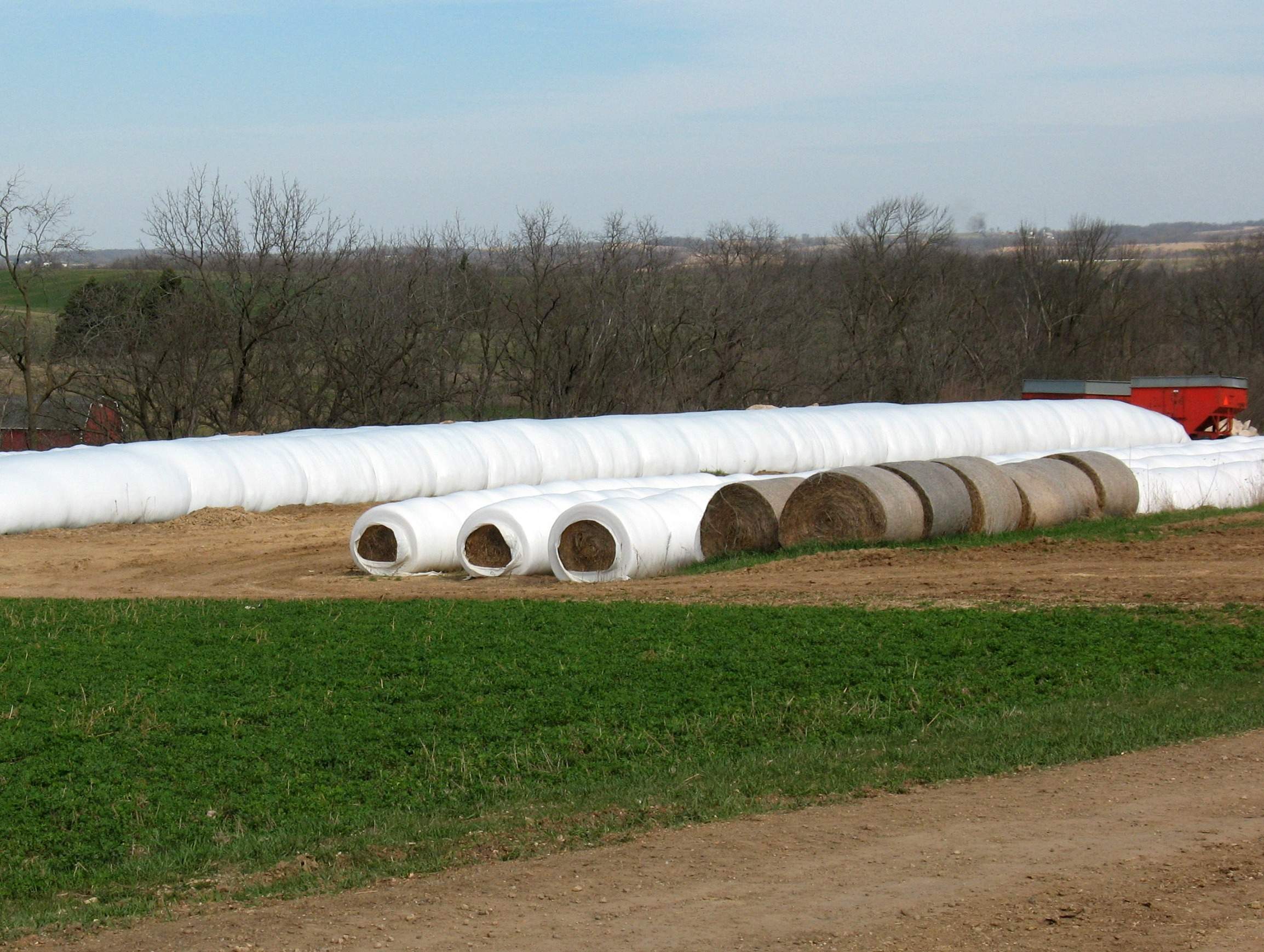
The major challenge in recycling ag plastic is transportation.

The major challenge in recycling ag plastic is transportation.
Wisconsin dairy and livestock farms are using silo bags, bunkers and wrapped bales at a dramatically increased rate over the last decade. Each of these tools relies on low-density polyethylene, a plastic film that provides a low-cost method for storing high-quality forages. It’s estimated that over 55 million pounds of LDPE thermoplastic is sold annually to Wisconsin farmers. But although ag plastics are increasingly popular, their disposal has become a big issue on many farms.
A statewide survey conducted by University of Wisconsin-Extension and the Wisconsin Department of Natural Resources in 2015 reported that about two-thirds of farmers use landfills for disposing of their used ag plastic. The second most common method of disposal is burning, at 30 percent, with 10 percent of respondents reporting they recycle the plastic. More than 1,500 farms and greenhouses around Wisconsin participated in the survey.
Burning ag plastic is illegal, and releases toxic and potentially cancer-causing chemicals such as dioxins and furans into the air. These toxins can be inhaled by humans and animals, and are deposited in soil and surface water. Residue from burning can also contaminate the soil and groundwater and enter the human food chain through crops and livestock. Moreover, unburned portions of plastic become litter on the ground, with larger piles creating breeding grounds and habitat for mosquitoes.
The survey indicates that 85 percent of farmers are willing to haul their plastic to a collection site for recycling. Ag plastic collection programs in Green County have confirmed that many farmers will drive up to 30 miles to recycle their plastic if there is no disposal charge. Green County farmers have a lot of used ag plastic on their lands, and most prefer to see it recycled versus burning it or paying up to $1,500 per year to dispose of it in landfills.
So why do Wisconsin farmers not recycle more ag plastic?
The major challenge in recycling ag plastic is transporting it from the farm to a collection facility for baling. Green County started recycling ag plastics in 2014 by having spring and fall collections during which farmers could dispose of their used ag plastic free of charge by hauling it to a local landfill. The county has since collected more than 250,000 pounds of used ag plastic and recently expanded its collection program to accept this type of waste every Wednesday from any area farmers willing to haul it to the collection facility.
Green County’s landfill department bales the used ag plastic into 1-ton parcels and sends them to a facility in Arkansas, where the material is cleaned, processed and recycled into trash can liners and other products. Having access to a large baler is a must for a plastic collection program, because the material must be compressed and packaged for transport to any processing facility. Several other Wisconsin counties offer recycling programs for ag plastics; local UW-Extension offices can confirm if local programs exist.
Green County accepts only No. 4 plastic (from the resin identification code) from silo bags, bunker covers, greenhouse covers, drip tape and bale wraps. Plastic twine, mesh bale wraps, plastic jugs, bunker covers with scrim nylon and all other types of plastic containers are not recyclable through this program.
Updated technology has solved cleanliness issues associated with ag plastic processing. However, farmers are asked to shake any excess mud, gravel, dirt, stones and feed off the plastic before storing it. They are also encouraged to landfill the bottom portion of silo bags because of the high amount of dirt and feed in that part of the bag.
A new pilot program
An even more potentially effective option for ag plastic disposal is being rolled out in Wisconsin this summer. As Green County's UW-Extension agriculture agent, I worked on a pilot program with Revolution Plastics in 2015 to place free dumpsters on 88 farms in Wisconsin and Illinois specifically for storing these types of plastic until the program picked it up for free. Due to the pilot's response, Revolution Plastics plans to offer this program to several hundred more farmers in Wisconsin in 2016.
Green County is serving as the first hub for this free ag plastic recycling program's rollout. An additional 200 dumpsters have been delivered to farms within a 100-mile radius and another 500 will be distributed to Wisconsin counties farther north by the end of July. The company hopes to serve 5,000 farms by the end of 2017. Dairy and livestock farmers interested in enrolling in the Revolution Plastics program, which provides free use of a dumpster and on-farm pickup, can get on a waiting list by registering online or calling 844-490-7873.
This program certainly has the makings of being a win-win for everyone involved. It will enable farmers to dispose of their used ag plastic at no cost and reduce the amount of plastic going to landfills and being illegally burned, while also recycling the unwanted material into new products.
Mark Mayer is a dairy and livestock agent with Green County UW-Extension. This article is adapted from an item originally published by Wisconsin Agriculturalist in May 2016.